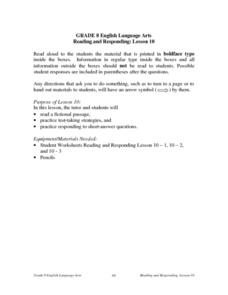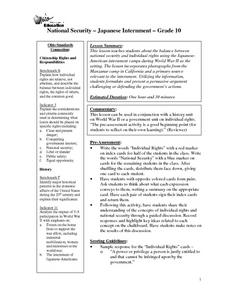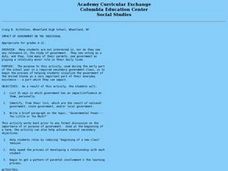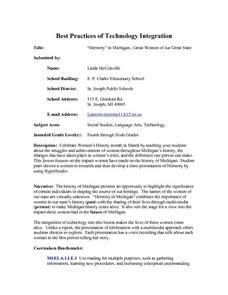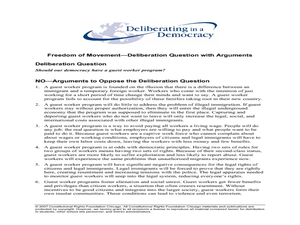Curated OER
What is a Democracy?
Students identify what makes a country democratic and compare United States and Indian political party symbols. They create their own political party and party symbol. They create a campaign speech, participate in the voting process...
Curated OER
Reading and Responding -- Lesson 10
Fourth graders work individually or in a small group to (1) read a fictional passage, (2) practice test-taking strategies, and (3) practice using context clues to increase their vocabulary. Reading passage and comprehension questions...
Curated OER
History Repeats Itself
Twelfth graders research historical turning points, gather-data, and extrapolate possible alternate outcomes. They work individually to choose one historical event from Attachment D, Historical Turning Points. Students complete either...
Curated OER
Graph it!
Sixth graders view a Stacked Graph, and discuss what it shows. Students discuss the basics of graphing: labels, intervals, legends x and y axis... Students create individual stacked graphs from provided information. Students view a...
Curated OER
Shapes Galore!
First graders explore two-dimensional shapes. Individually, children follow directions to draw shapes. Learners use shaving cream, geoboards, yarn, marshmallows, and toothpicks to create shapes. As a class, 1st graders brainstorm...
Curated OER
That's The Story!
Images can inspire powerful writing. Engage your class in narrative writing with the idea included here. Individuals each snap a digital photograph that includes action. The teacher then mixes these up and hands each class member a photo...
Houghton Mifflin Harcourt
Four-Quadrant Grid
This is a nifty tool to keep on hand, especially when addressing CCSS.Math.Content.6.NS.6 standards. It is, simply, a Cartesian coordinate plane with all four quadrants. Give individuals one each, and then call out or write ordered pairs...
Curated OER
National Security - Japanese Internment
Tenth graders investigate the balance between national security and individual rights using the Japanese American internment camps during World War II as the setting. The lesson incorporates photographs from the Manzanar camp in...
Curated OER
Nevada
Students can learn more about the state of Nevada with this worksheet, which provides the state flag and prompts for other facts, such as state motto, state flower, and state capital. This assignment could be a good class activity or...
Curated OER
Individual Responsibility and Resistance During the Holocaust
Students examine the role of resistance during the Holocaut. Identifying misconceptions, they discuss them as a way to gather the truth about this time in history. They explore the roles of various groups of resistance and share this...
Curated OER
Impact of Government on the Individual
Learners make a list of how the government impacts their lives and discuss it with their parents. In this government lesson plan, students also write a paragraph about what they discussed.
Curated OER
The State of the Family Timeline
First graders study concepts of time and chronological history. In this early childhood history lesson plan, 1st graders create and interpret a timeline listing historical events and family celebrations using one calendar year.
Curated OER
BIGGER AND BIGGER: (We Live in a family, a neighborhood, a city, and the United States)
Learners discover that they are part of bigger and bigger groups. They begin with families and work up to belonging to North America as they initiate a study of the whole country.
Curated OER
Herstory in Michigan -- Women's History in Our Great State
Celebrate Women's History month in March by teaching your students
about the struggles and achievements of women throughout Michigan's history, the changes that have taken place in women's roles, and the difference one person can make.
Curated OER
Compare the United States Government with Other Political Systems
Young scholars explore the U.S. form of government and illustrate other forms of government found throughout the world. They explain the similarities and differences between the U.S and other governments.
Curated OER
Individual Rights - The Right To Equal Protection
Students examine the concepts of equal protection, discrimination, affirmative action, and racial profiling. They analyze the Equal Protection Clause, participate in a mock trial, and discuss the different parts of the trial.
Bill of Rights Institute
Celebrate Constitution Day
September 17 is a great day to focus on the US Constitution for on this day in 1787, the Constitution was signed. Through a series of activities, high schoolers get a chance to look closely at this famous document and the rights and...
University of California
The Civil War: Perspective
Confederate soldiers saw the Civil War much differently than their Union counterparts. Scholars analyze the perspective of the Civil War from the viewpoint of various key figures in the fourth installment of an eight-part series. By...
City University of New York
Electoral College
A presidential election is a lot like the 2004 World Series, and it's also a lot like choosing an orange in a paper bag. Apply the process of the electoral college to these two analogies with a set of lessons about government...
Curated OER
It's a Gas! Or is it?
Oceanography enthusiasts are given a series of thought experiments to consider in order to relate the solubility of gases and solids to underwater volcanoes. It is not particularly engaging to perform these thought experiments. Choose...
Deliberating in a Democracy
Freedom of Movement
Class members examine human migration. For this population lesson, they read an article entitled, "Freedom of Movement" and respond to discussion questions about the article related to guest worker programs.
Curated OER
Running for Freedom: The FUgitive Slave law and the Coming of the Civil War
In order to understand the complicated nature of slave laws during the Civil War, learners compare and contrast an abolitionist poster and a runaway slave ad. They use an attached worksheet to consider each primary source document, then...
Alabama Department of Archives and History
An African American Represents Alabama during Reconstruction
The era after the Civil War saw a flourishing of African Americans exercising their rights. Using graphic organizers and Internet research, pupils consider the legacy of Benjamin Sterling Turner, who sat in Congress. Afterward, they...
National Endowment for the Humanities
George Washington: The Precedent President
Everyone knows that George Washington was the first president, but do your scholars know why that was so important? The lesson plan, the third in a sequence of three, allows learners to understand how George Washington set a precedent...



